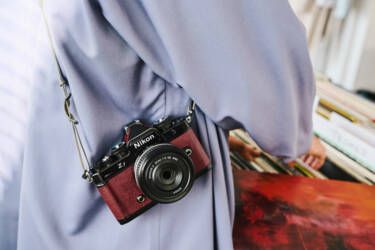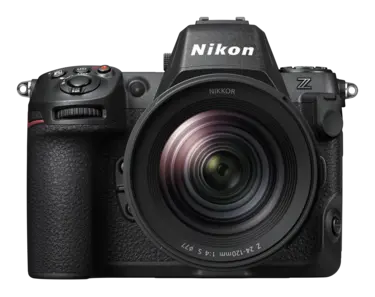How to photograph soft and dreamy snowscapes

Bokeh balls, searching for the light and patience are the key to dreamy snowscapes, says nature and landscape photographer Eeva Mäkinen
“I long for peaceful moments in landscapes,” Eeva Mäkinen begins. “My style is to find unique light in untouched surroundings.” The Finnish Nikon Creator and wilderness guide has been snapping photos for the last 15 years, and has recently returned from Kuusamo, Finland, filming Nikon’s latest series The Human Prompt. Here, she shares her tips to photographing better minimalist snowscapes.
Polish your survival skills
When Eeva was a child, she dreamed of traveling the world. “As I grew older, it hit me that I could find beautiful places closer to my home in Finland. That’s when I went to the wilderness guide school and spent many nights outdoors. It was here that I realised I wanted to be a photographer and photograph in the Nordics,” Eeva says. “Knowing survival skills is incredibly important, especially if you’re photographing alone. You need to know how to survive a -35°C night.”
Top tip: Research the location you’re photographing before you visit so you know the safest path. Bring plenty of water and stay warm with extra layers.

©Jarno Schurgers
Kit up
Eeva uses a Nikon Z 7II and Nikon Z 8 with the NIKKOR Z 14-24mm f/2.8 S, NIKKOR Z 35mm f/1.8 S, NIKKOR Z 20mm f/1.8 S, NIKKOR Z 24-70mm f/2.8 S, NIKKOR Z 70-200mm f/2.8 S, NIKKOR Z MC 105mm f/2.8 VR S and NIKKOR Z 400mm f/4.5 VR S. She uses a variety of lenses while photographing, but loves primes for their beautiful bokeh and wide apertures. Before you go out for a long photoshoot, invest in a solid camera backpack (which can double up as a tripod!) and warm layers to cover you head to toe, plus snowshoes. “Taking photos in extreme cold is dangerous without gloves. Gloves are a must,” Eeva advises.
Top tip: As extreme cold weather can affect batteries, always bring extra ones. Eeva never leaves her house without a lens warmer to heat and defog the glass.
Search for the light
“The best light is always when it’s the most uncomfortable to go out, whether that’s early in the morning or late at night,” Eeva says. “I don’t avoid photographing at a specific time, but I tend to shoot at sunrise and at night, and sometimes during the day when you can find animals awake.”
Bokeh balls offer a softer look
While filming for The Human Prompt, tasked with the prompt ‘Light in the darkness, darkness in the light’, Eeva photographed swans on a lake (below) using a double exposure – a technique that layers two different exposures on a single image, combining photographs. “I was really happy to try something I hadn’t really done before with that kind of light,” she explains. “It was very difficult, harsh daylight and I was able to get the softness I wanted with a double exposure.” Using the NIKKOR Z 800mm f/6.3 VR S, she wanted to contrast the dark waters with the light of the swans.
“I was really happy to see all the hundreds of swans in one place, but the light was hard, and I was trying to get something new,” Eeva explains. The key to improving is constantly testing yourself which is why she returned to the same lake the next day. “We had less than an hour before we had to finish up,” she says. “I was lying in the snow photographing swans moving and opening their wings and trying new angles. The ground was very sunny that day, the ice looked like diamonds and it produced nice bokeh balls, with some of the image in focus and out of focus.”
(From left to right) Photo 1: 400mm, 1/20000 sec, f/5.0, ISO 400. Photo 2: 20mm, 10 sec, f/1.8, ISO 1000. Photo 3: 135mm, 1/1000 sec, f/2.5, ISO 1250
Scout for locations first – and return when you can
“I do plenty of scouting with my dog! A lot of landscape and nature photography is waiting for the right weather conditions. I’d always suggest finding a beautiful place and taking as many photos as you can at different angles, and then return if the weather conditions aren’t quite right,” says Eeva. “In one of the locations I’ve always wanted to photograph, I had to wait for two years before going back with the conditions I wanted! I had a specific image in my mind for another place near home and had to wait four years for the right conditions – once it had too much fog, then none at all. I kept visiting every autumn, trying to get the perfect image. It was a long wait, but it was worth it.”
Watch episode five of The Human Prompt below and follow Eeva on her Instagram here.

Real-life stories behind the photos with Eeva Mäkinen
Click the button to play
Introducing The Human Prompt
Featured products
More in snowscapes
Wildlife photographer Lina Kayser on building connections and photographing animal emotions with the Z 9
Mountain sports videographer Aurelie Gonin on filming in the snow (plus settings)

For limitless creativity














